May Berry
by Larry Hume - used here with permission
Lottie May Berry was born in the small unincorporated community of Mays, Rush County, Indiana on October 27, 1888 to Hoosier natives Ida Leora Pugh and William R. Berry. She had an older sister Mary who died in infancy in 1886 and four younger brothers, Carl, Howard, Ralph and Robert. When she was two years old the family moved to Madison County where her father provided on the family farm as many did at that time. When Lottie was 14 her father passed at the early age of 36. In the year 1910, she moved to Indianapolis and entered the Deaconess Hospital School of Nursing and her mother remarried Harvey R. Miller on August 15. Lottie graduated from Deaconess Hospital in 1913 and her brother Ralph died at age 18 that year.
Following graduation she entered nursing in the private sector and made her home with Mr. and Mrs. Fred B. McNeely, 717 East Twenty-third Street, Indianapolis. The United Stated declared war on Germany on April 6, 1917 and entered the World War that had been raging in Europe since 1914. Obviously, doctors and nurses would be needed. With only 403 nurses in the Army Nurse Corps (ANC) when the war began, the Surgeon General called for volunteers. Women in hospitals and private duty as well as many in training responded. Those already staffing hospitals could join the ANC through the Army's newly established base hospital system and through the American Red Cross. By the end of the war, 21,480 women served in the Army Nurse Corps rendering service "beyond expectations" at a time when women were not even allowed to vote".
On September 7, 1917 Lottie May Berry and 31 other nurses took the oath of office at the Indianapolis City Hospital and were assigned to active service in the Army Nurse Corps, Base Hospital 32. This hospital was also known as the Lilly Base Hospital as Josiah K. Lilly, president of Eli Lilly and Company was largely responsible for its foundation through a large charitable donation. Two days later these nurses left Indianapolis under orders to proceed to US Army General Hospital Number 1, Gunhill Road and Bainbridge Avenue, New York to await transportation to France. Just prior to boarding the train the unit received an American Flag from the Indianapolis City Hospital Alumnae Association and an Indiana state banner. The Indianapolis Chapter of the American Red cross gave each nurse a rubber blanket and fifty dollars in gold. Upon arrival they were joined by nine other nurses from other states and were quartered in barracks at the Columbia War Hospital, drilling and adjusting to military life. They participated in the Red Cross parade on October 4 in which 10,000 women in service of the Red Cross marched down Fifth Avenue. The nurses of Base Hospital 32 in blue dresses without capes, marched with 2,000 other nurses, who were soon to be in service in France.
At 10 p.m., the night of December 4, 1917, aboard the SS George Washington, a German ocean liner that had just recently been repurposed as a troop transport, the staff of Base Hospital 32 began their crossing of the Atlantic. Lottie had named her mother, Mrs. Harvey Miller as her next of kin. It would not be until the morning of Christmas Eve that the men and women of Base Hospital 32 would finally feel land under their feet again as they landed at Brest on the Northwestern coast of France. On the voyage, Lottie and 31 other nurses were taken seriously ill. Instead of traveling on the town of Contrexeville with BH 32 Lottie was taken to Naval Hospital 1 in Brest where she died on pneumonia on December 30, 1917. She is said to have been the first American nurse to die on foreign soil during the war. According to various newspaper articles her mother Ida first learned of her daughter's death from a newspaper correspondent of the Indianapolis News and later confirmed through representative Albert J. Vestal of the Eighth District. May was buried New Year's Eve, 1917 in temporary Grave # 197, Row 1, Plot B, Kerfautras Cemetery, Brest, France. The Indianapolis Star Newspaper reported Memorial Services were held January 27, 1918 in the Nurses Home of the Deaconess Hospital. More than 100 fellow nurses were present and with several times that number of friends.
In October 1919, families of fallen American military were given the choice of leaving their sons/daughters buried in an American Cemetery in Europe with their comrades or bring them home for reburial in a State or National Cemetery like Arlington or a cemetery in their hometown. Mother Ida chose to leave Lottie with those she served and served with as did approximately 30% of the families. On July 25, 1922, she was disinterred for the final time and reburied in Plot D, Row 21, Grave 21 of the Oise-Aisne American Cemetery and Memorial, Fere-en-Tardenois, Departement de l'Aisne, Picardie, France. Day is done, God is nigh.
Epilogue:
Her brother Robert survived the war with service in France from October 14, 1918 to June 24, 1919, Company I, 151 Infantry Regiment. Hopefully he had the opportunity to visit his sister's grave.
Seven years later in 1929 Congress enacted legislation that paid the travel expenses to the grave sites for mothers and widows whose sons and husbands had died overseas as members of the American Expeditionary Forces (AEF) during the war and whose remains are now interred in such cemeteries. Sadly Lottie had no relative that was eligible to visit her grave under this program as her mother had died January 22, 1926.
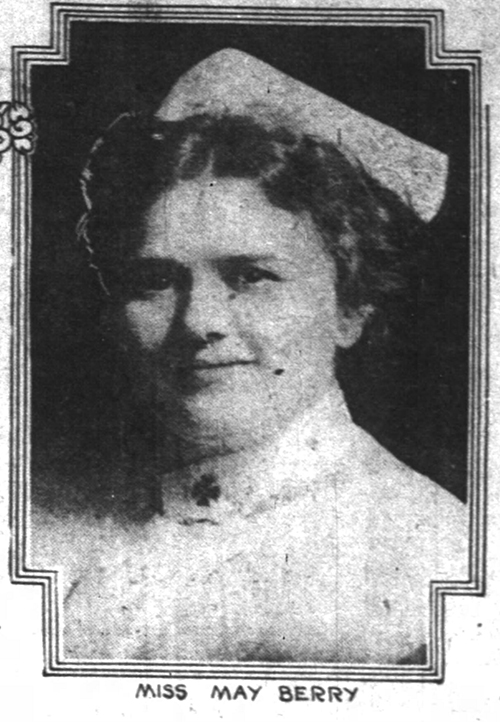
May Berry, nurse with Base Hospital 32, died of pneumonia shortly after the unit reached France.
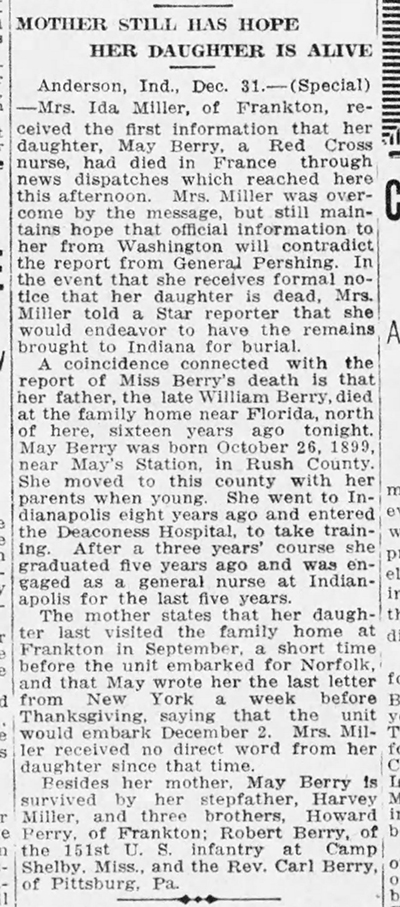
1 January 1918 issue of the Muncie (Indiana) Star Press
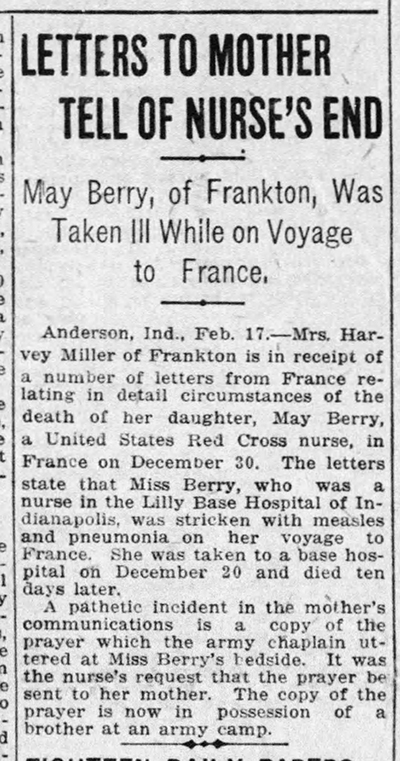
18 February 1918 issue of the Muncie (Indiana) Star Press
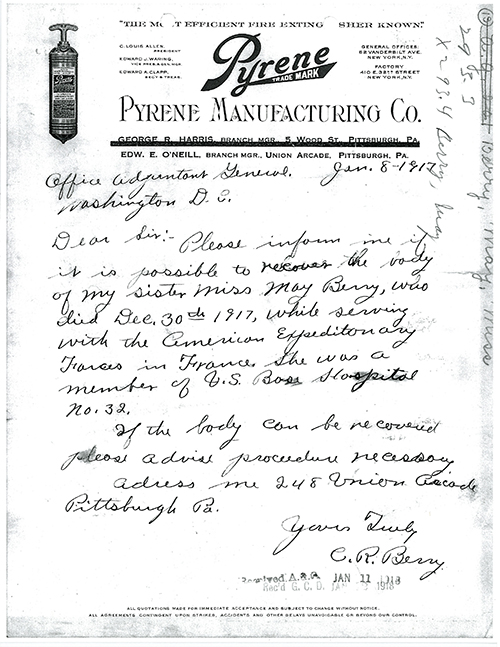
From the Burial Case File for May Berry - her brother writes to inquire about her remains. The War Department responded to his letter with information about the location of May's initial burial site. Her family elected to have her remains stay in France.
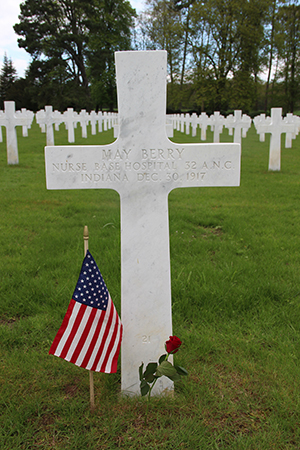
Today May rests in the Oise-Aisne American Cemetery at Fere-en-Tardenois, in Aisne, Picardie, France.
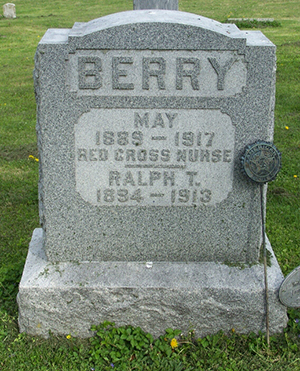
A centotaph in the French Cemetery at Frankton, Indiana, also remembers May Berry.
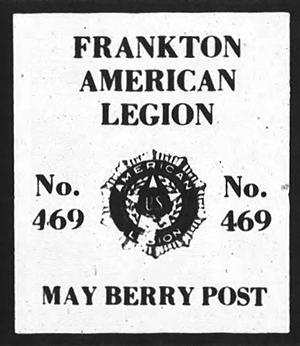
The American Legion post of Frankton, Indiana, honors May Berry, but a 2018 newspaper article in the Frankton Herald Bulletin reported that the post was in danger of closing due to dwindling membership and support.